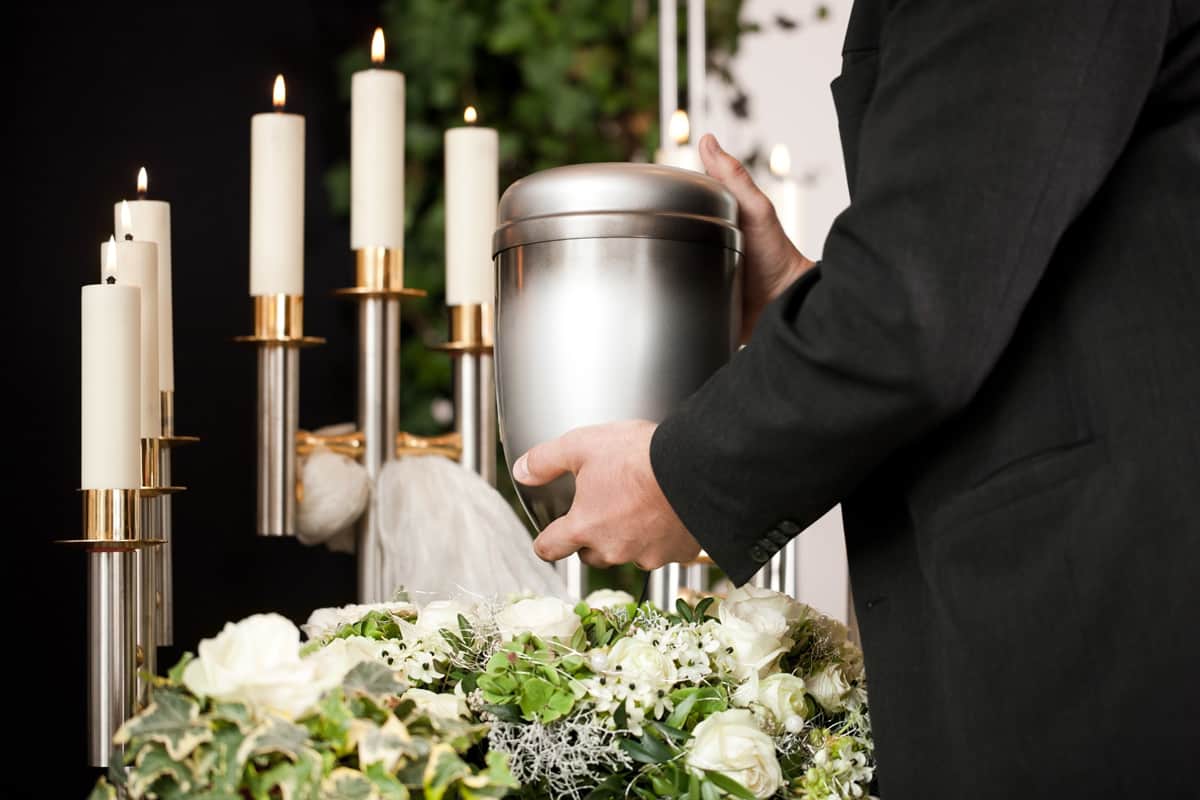As cremation is growing in popularity as a disposition choice, we find that more people are searching online to discover the laws for cremation in their state. As a body is completely reduced to just ashes in the cremation process, there are quite strict laws governing the cremation of a body.
There are licensing and operational requirements for crematories and state laws governing who can authorize cremation and how long a cremation can be performed after a death.
If you have an immediate need for a low-cost direct cremation – Visit DFS Memorials Affordable Cremation Locations Nationwide.
Who can authorize a cremation?
The next-of-kin is normally considered the person responsible for authorizing a cremation. In some states, this is referred to as the “authorizing agent.” For a cremation to proceed, the next of kin must sign an authorization form or declaration for the disposition of cremated remains.
This is generally referred to as the ‘Cremation Authorization Form.’
The legal next of kin are the spouse, parents, adult children, siblings, adult grandchildren, nephews or nieces, maternal grandparents, paternal grandparents, adult aunts or uncles, first cousins, or any other adult relative in descending order of blood relationship.
If there is more than one legal next of kin, for example, if a parent dies and it is left to several children to make the funeral arrangements, all the children must agree and sign the cremation authorization form.
What is a Permit to cremate?
Once the death certificate and authorization form have been filed, the county where the cremation is to take place issues a permit allowing the crematory or funeral home to go ahead and cremate the deceased.
This permit is referred to as a ‘cremation permit’ or a ‘disposition permit.’
The charge for this cremation permit is often added to the general price for cremation, as is the fee for the death certificate.

The cost for a cremation permit varies depending on the issuing County but is usually between $10-$40. Some counties still do not charge for a cremation permit. However, many counties are now inflating their cremation permit fees as the demand for cremation increases.
How do state and local laws on cremation vary?
Each state, and even each County, has its own variations on federal cremation regulations. There is usually at least a 24-hour waiting period after the death before the deceased can be cremated, but in some states, the law on cremation states that 48 hours must lapse between the death and the cremation. The coroner or public health department can override this if there is a public health concern and the body must be immediately disposed of.
Do cremation providers need to be licensed?
Yes, all cremation providers are regulated and must be licensed. There are also industry regulations and practices to ensure the ethical and safe handling of the deceased in crematories. There are rules that stipulate the handling of cremated remains that ensure you can be assured that the cremated remains you receive are exactly, and only, the remains of your loved one.
Although a crematory operative does not necessarily need to be a licensed funeral director, most crematory operatives complete a course and gain certification to ensure they are correctly trained to follow the procedures and processes required.
What is the process for a cremation?
As mentioned above, crematories have a strict code of standards to ensure that dispositions are ethically managed. Only one body can be cremated at once, and all cremated remains must be cleared from the cremation chamber before another cremation can begin. These standards do mean that you may have little input into any ‘customization’ of a cremation process.
Once your loved one is received into the care of the crematory, he or she will be ID-checked and tagged to ensure that checks can be made at all steps of the process.
If the deceased has any medical implants, these are removed, and the body is prepared for cremation. The deceased is placed in a suitable rigid combustible container and placed in the cremation chamber or retort.
Cremation is the process of adding intense heat to reduce the body to cremated remains or ashes. The process reduces the human body to its base elements, which can take 1 – 4 hours, depending upon the cremation machine.
The cremated remains following the cremation are actually bone fragments, which are then mechanically ground to a powder. Usually, there are about 3 – 9 pounds of cremated remains for the average human body.
Is a casket required for a cremation?
No, you do not require a casket or coffin for cremation. Most state laws stipulate that an “alternative container” is required. This can be any rigid, combustible container; a rigid cardboard or plywood/laminate container is commonly used.
If you have a service and require a casket, you can usually use a rental casket supplied by your cremation provider or funeral home. Eliminating the need for a casket can significantly reduce your overall funeral costs.
Can I view the actual cremation process?
Some crematories will allow you to view the initiation of the cremation process. Some crematories will allow you to initiate the process by pressing the button, as some faiths require this.
If this is important to you, you should check this before selecting a cremation provider. Most crematories do open their doors to the public. However, many families prefer not to witness any aspect of the process.

What laws govern what I can do with the cremated remains?
Again, laws governing what you can and cannot do with cremated remains can vary from state to state. Although you should check specific state laws, the general guidelines are:
- You cannot commingle cremated remains unless with the specific request of the deceased.
- You can keep cremated remains at home.
- You can have them buried or stored in a niche or columbarium
- You can have them added to an existing grave, i.e., a spouse or family member already buried
- You can scatter cremated remains in a designated place, i.e., a memorial garden
- You can scatter remains on private or public lands with the appropriate permission.
Visit our Funeral Guides by State in the Resources Section to check specific ash scattering laws for your state.
Why should I choose cremation?
It is a personal choice of whether cremation is the right disposition option. Many consider it more environmentally and eco-friendly than a traditional burial. It eliminates the need for embalming chemicals and the need for steel caskets and concrete burial vaults to be buried in the ground.
Cremation has been around for many, many centuries and, in some religions, is considered the only and most spiritual way to dispose of the dead. The Catholic Church also now accepts cremation. Many modernists prefer the idea that their DNA is, in effect, eliminated.
One significant reason why more Americans choose cremation is that it is much cheaper than a traditional burial. The cremation rate in the U.S. is now at around 59% and is forecast to reach as high as 70% by 2025.
Read our post about 3 Important Things to Consider about Cremation for an exploration of how the rising cremation rate may impact cremation costs moving forward.
How much does a cremation cost?
A cremation can cost anything from $750 to $4,000, depending on exactly how extravagant the funeral service is and where you are located. In many of the states where the cremation rate is higher, prices are more competitively priced, and a basic cremation can be purchased for around $800 – $1,000. The prices for a direct cremation in Florida, California, and Nevada can be as low as $750.
What is a direct cremation?
A direct cremation is where the deceased is collected and transferred directly to the crematory (or funeral home), and an immediate cremation is conducted. This requires the minimal services of a funeral director, so the professional fees are lower.
Be sure to check exactly what is included in a direct cremation package. Some firms quote a price but do not include the actual crematory fee or the fee for the cremation container. Most reputable funeral homes and cremation providers that offer a direct cremation package will include the following:
- The basic services of a funeral director to collect the deceased and file any necessary paperwork, i.e., authorization form, death certificate & cremation permit.
- Temporary storage, if required
- An alternative cremation container
- The crematory fee
- A temporary receptacle for the return of the cremated remains
- Most funeral homes will offer you incremental services & products, such as choosing a more elaborate cremation urn.

What is the difference between a cremation with service and a direct cremation?
A cremation with service is just like an ordinary funeral service. The deceased can be present in repose during the service, cremation is performed instead of a burial, and the ashes are later returned to the family. Whereas a direct cremation is conducted without any service.
Read our article on Traditional Cremation vs. Direct Cremation Services: What You Need to Know.
Can a body be transported over state lines to be cremated?
Yes, the deceased can be transported across state lines for a cremation. If the deceased is to be transported over any distance, and a period of over 24 hours may elapse, embalming may be required. Airline funeral shipping companies have specific regulations to meet, which can involve using a designated air-freight mortuary shipping container.
Visit our section on Funeral Shipping for further information.
What alternative options do I have to memorialize cremated remains?
There are so many options today for what you can do once you have your loved ones cremated remains. There is a whole array of cremation urns, keepsake urns, and all sorts of weird and wonderful cremation receptacles. You can scatter the ashes, all of the ashes, or scatter some and retain some. You can have a diamond made from cremated remains or other unique glass-blown jewelry.
In fact, there are so many options, and we have tried to comprehensively list the categories on our Ash Scattering page.
Can an obese or overweight person be cremated?
Yes, an obese person can be cremated. However, this can prove a little more difficult and costly. First, a crematory with a wider retort chamber door will be required to fit a larger cremation container through.
Secondly, a stronger cremation container and extra lifting equipment may be required. This generally means that many crematories charge an additional fee to cremate a bariatric-weight person. An additional fee may be incurred for a person weighing above 300 pounds.
Where can I find more information about cremation?
Visit our Ultimate Guide to Cremation for more FAQs about Cremation and 3 Important Things To Consider About Cremation in 2023.
If you want to read further about cremation, you will find that US Funerals Online has a Resource Section on Cremation with numerous related articles.
Visit our detailed Guides to Cremation Costs near you:
Guide to Cremation Costs in New York
Guide to Cremation Costs in California
Guide to Cremation Costs in Pennslyvania
Guide to Cremation Costs in Florida
Guide to Cremation Costs in Georgia
Guide to Cremation Costs in Illinois
Guide to Cremation Costs in Tennessee
Guide to Cremation Costs in Arizona
Guide to Cremation Costs in North Carolina
You can also visit the Cremation Association of North America (CANA), 499 Northgate Parkway, Wheeling, IL 60090 http://www.cremationassociation.org/
You can also read more in detail about the history, culture, religious variations & memorialization aspects of cremation on Wikipedia. http://en.wikipedia.org/wiki/Cremation



